Skip ahead
Off-page SEO is a powerful SEO tactic that plays a large part in getting a site to rank higher on Google. If you want to get people talking about your brand and services, you should go beyond your own website using off-page SEO techniques.
In this guide, we are going to dive deep into the ins and outs of off-page SEO and help you get a better idea of what it is, why it is so vital to online marketing, and the activities involved in it. Read ahead and take notes on how to obliterate competing businesses in Google search results and drive sales growth ro your digital space with professional seo services.
What Is "Off-Page" SEO?
So, what is off-page optimization in SEO and what connection does it have with your business website? Off-page SEO is an umbrella term for indirect SEO-related actions aimed at boosting the site on the net that occur away from said site.
Contrary to a commonly held belief, there’s more to off-page SEO optimization than acquiring links. There’s a wide variety of techniques that can be used to give your online venture an advantage over competition. Off-page SEO can last for years, increasing your site’s domain rating in the eye of Google and other search engines.
A lot of industry experts consider external optimization to be of even more importance than internal or on-page SEO. However, we at Direct Line Development still believe that both are essential as far as SEO promotion is concerned.
THE MOST POPULAR OFF-PAGE SEO TACTICS
There are many off-page SEO strategies which will work, here we propose to consider the most effective and popular:
- Brand building - use direct advertising campaigns or sponsorship to promote your business on the Internet.
- Citation building - choose relevant directories in order to be found by consumers.
- Content marketing - create and publish your content on credible sources out from your site. Writing guest posts, infographics, case studies is one of the most effective of all off-page SEO techniques to get covered by TOP-rated sites.
- Social media - use social media to attract new audiences and promote your business.
- And more
Why Off-Page SEO Matters?
Google uses over two hundred factors for ranking sites. It’s difficult to rank based on content alone; this is where off-page SEO comes in. By telling Google what others think about you and your site, you are helping it determine how much your content is relevant for users. This is why getting links from quality websites is key.
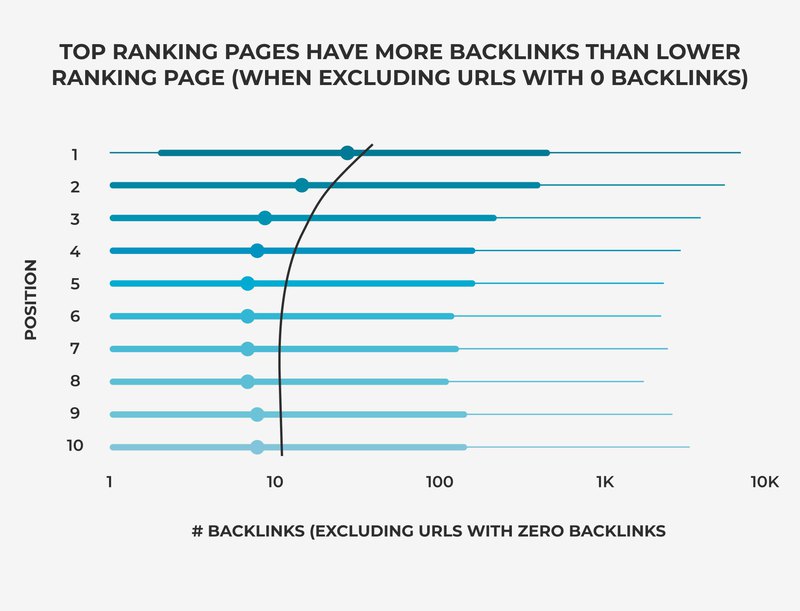
Links from reputable resources to your site help promote your site in search engines. Such tactics of off-page SEO helps to increase the ranking of the site, establish trust not only with customers, but also with search engines. The criteria of authority differs for users and search engines. To establish trust with customers you need to place useful and attractive content while Google themselves state that they use other off-site SEO factors to rank your website and recognize the site as authoritative. For example: quality of backlinks, follow vs nofollow links, quantity of referring domains and more.

Technical Vs. On-Page Vs. Off-Page SEO: What’s The Difference?
Among the ranking factors used to evaluate websites, the most commonly mentioned terms are technical, on-page and off-page SEO. Let's break down each one of these three factors and understand what is on-page and off-page SEO:
- On-page SEO refers to the SEO strategies used directly on the website. Optimized site content helps search engine robots that scan websites 24/7 to understand how helpful the content of your website is for users and compare it to competing websites. Text content, photos, meta tags, links — all of these fall under this category.
- Off-page SEO covers all the SEO activities that take place outside of the confines of the website. Link building is the king of off-page SEO, plus there are many other things you can do off the website to get it to rank higher, such as good old PR, social media marketing, etc.
- Technical SEO aims at improving the crawling and indexing of the site by Google algorithms. It includes improving the speed, structure, URL canonicalization, and more.
In the table below you can clearly see the difference between on-page and off-page SEO and technical SEO:
| On-Page SEO | Off-Page SEO | Technical SEO |
| Content | Link Building | Site speed |
| Meta tags | Content Marketing | Well-structured data |
| Heading optimization | SMM | XML Sitemaps |
| Internal linking | Blog posting | Canonicalization |
| Image optimization | Customer reviews | Hreflang tags |
| & more | & more | & more |
Trying to choose between technical, on-page, and off-page SEO is like choosing what to build for your house: the foundation, the walls, or the ceiling. There’s no choice here: if you want to improve your search engine ranking, you must put effort into all of them - no skipping!
What Is Best For Off-Page SEO?
A common misconception among SEO newbies is that link-related activities are the only ones that matter. In reality, Google's algorithm pays close attention to a number of factors for ranking content.
Link building can only get you so far. Why not take advantage of a great variety of other SEO tools and strategies that can boost both your website and your brand?
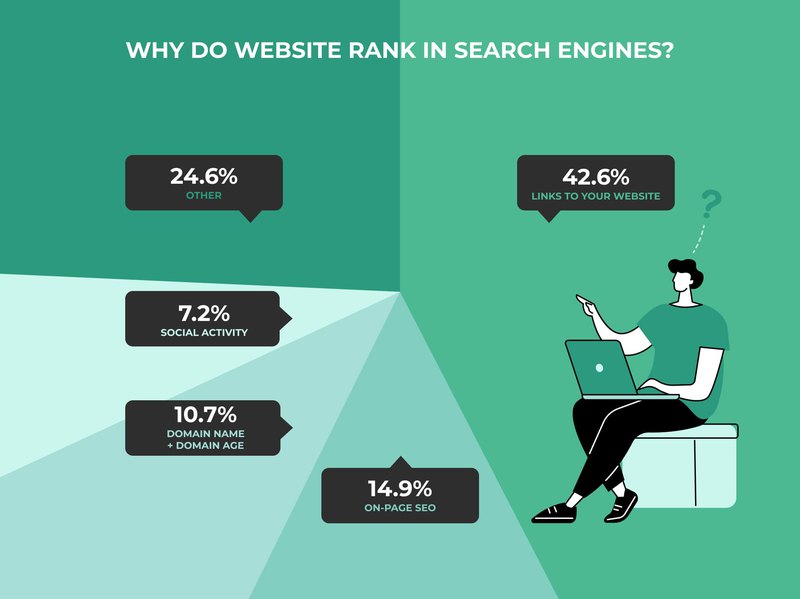
While working on your off-page search engine optimization, you should carefully consider the following:
- Domain Authority – This is a score set up by Moz to give an overview of a website’s performance. When doing off-page activities, you must always bear in mind the importance of this metric. Domain authority, or simply DA, assess website performance and quality. If a back link leads from a website with higher DA to a website with lower DA via a do-follow link (discussed below), it helps the lower DA website get a better page rank and get higher in SERPs.
- Relevance – Getting links from high-DA sites is the way to go; however, it is even more crucial that these sites are relevant to the one you're linking to.
- Site traffic – When doing off-page activities like forum posting, bloggers outreach, etc. you need to figure out how much traffic these sites/people can drive towards you.
- Link Type – Here are the two main types of links involved in link building or promotion activities.
- Do-Follow Links. A do-follow link is the default link type that allows Google bots or spiders to pass value to the link or webpage that is linked to. Google observes the number of do-follow links and the amount of separate domains you get then from. The more the number of do-follow links from multiple and relevant sources, the more the value that is being passed.
- No-Follow Links. A no-follow link type means Google bots or spiders will not follow such links. They won’t pass any value to the page where it is linked to. No-follow links won’t make any difference for your rankings. No-follow links were introduced in an attempt to stop web spam.
How To Do Off-Page SEO For One-Page Websites?
If you are a small site with little content, link building is extra important for you because your on-page optimization options are so limited. We recommend putting all of your efforts into off-page SEO optimization to build relationships that can strengthen your online presence. Here are some efficient ways of achieving this:
Friends & Family
The most obvious and easiest from off-page optimization steps. Does your friend or family member have a blog? Why not ask them to put a link to your website in their next post? Almost 80% of Internet users read blog articles, and you better take advantage of that if you can.
Local Newspapers
If you are in a small business operating out of a small town, your local newspaper probably is more likely to have more influence than any other local websites. Next time you’re launching a new product or service, reach out to the local media outlets to let them know everything about it. This way, everyone wins: the newspaper gets a new story, you get more exposure, and the readers learn about your offerings.
Your Business Partners
Assuming you’ve established a solid relationship with your suppliers, manufacturers, retailers, exporters, and other business partners, a simple request to add a link to your site to one of their pages may help you build a stronger backlink profile. Here’s a tip: if you are using a specific type of equipment or software, this is your chance to get featured on their website, as well. Don’t be shy and get started on that email right away!
Your Local Chamber of Commerce
How about paying your local chamber of commerce to post a link to your site? This is another opportunity that is unfortunately often overlooked by local businesses.
Off-Page SEO Checklist
So, what is the most important part of off-page SEO? Let’s have a look at the off-page SEO checklist and figure out how to best incorporate them into your marketing plan.
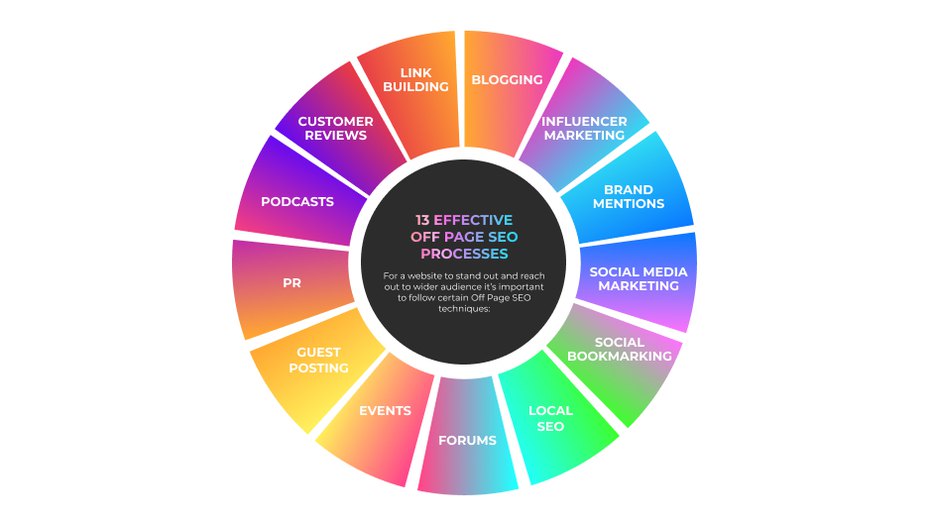
OFF-PAGE SEO CHECKLIST IN 13 STEPS:
- Social Media Marketing
- Blogging
- Link Building
- Social Bookmarking
- Influencer Marketing
- Brand Mantions
- Local SEO (GMB & Citations)
- Costumer Reviews
- Forums
- Events
- Podcasts
- Guest Posting
- PR
Social Media Marketing
While social media does not have a direct, immediately obvious effect on SEO, the link here (no pun intended) is simple: the more your website is mentioned across various social media platforms, the better your exposure.
How Is Social Media Intertwined with SEO?
Search engines do not see social media as a strong ranking factor, but it can still dramatically impact SEO nonetheless. There are several ways in which SMM improves SEO:
- SMM ensures efficient distribution of your content across multiple outlets.
- It enhances your brand reputation & recognition.
- SMM helps boost your local SEO rankings.
Again, even though social signals aka shares do not make a direct contribution to SEO, it should be painfully obvious even for a newbie marketer that the more users share your content, the better. The more attention to your offerings increases so does your brand recognition… And this leads to more branded searches, which in turn improves your SEO performance. What’s most important here is to actually create interesting content that can get more people to get genuinely curious about you and your products and services. Easy discoverability will help you build a great online presence and reputation in the long run.
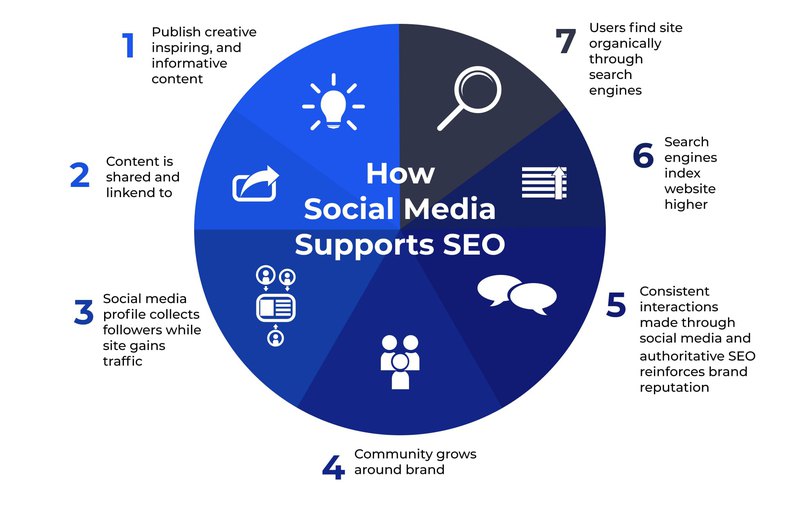
Blogging
One of the most advantageous off-page SEO activities - guest blogging - helps you kill two birds with one stone and build both links and your reputation.
Whenever you’re making a guest appearance as a writer on another website or blog, the site often allows you to insert a link that leads back to your own site in the post or author bio. This is an added bonus point for your brand awareness efforts as your name and brand are being featured in a new place.
Guest blogging can be broken down into these simple steps:
- Compile a list of online spaces and communities within your niche that accept guest bloggers or third-party entries or articles
- Research content, tone, and main user base of every site
- Brainstorm a list of possible content ideas that would be a good match based on the blog’s brand, audience, and needs
- Contact the site webmaster or editor and pitch one of your ideas
Link Building
This is the most talked about aspect of digital promotion, and for a good reason. All other things being equal, the more efficiently the site is promoted by links, the higher it is in SERPs.
In the coming years, we may see the following trend in link building: the more difficult it is to get a link from a site, the more efficiently it will work. With the right approach, any link acquisition method works, including outreach, blogs, scholarships, donations, press releases, as well as links from educational (.edu) and government (.gov) websites and crowd marketing.
As far as link building is concerned, the only sure way to figure out what works and what doesn't for your own site is through trial and error. Don’t be afraid to experiment! The worst thing that can happen is, you may not show up in searches as often as you want. Backlink Analytics will help you to check which backlinks are useless for your off-page SEO promotion.
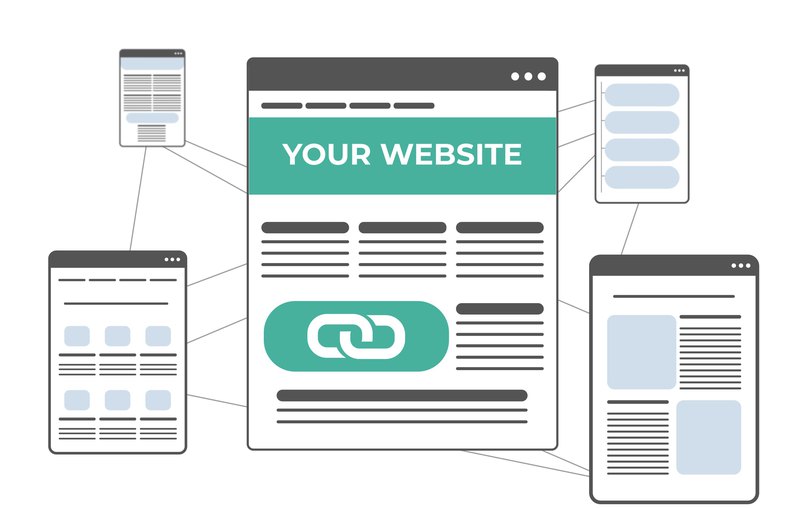
Types of Links For Off-Page SEO
Links are one of, if not the most critical element of off-page SEO. Before you get to building backlinks, however, you should develop a better understanding of the different types of links, as well as the many criteria that affect link equity of your website. The three main types of links are:
Natural Links
A natural link comes to your website, well, naturally, meaning your team did not do anything to earn it. The person who mentioned you on the web simply decided to link to your site, whether because they follow your brand or discovered your content via googling. Either way, they found your content valuable and worth praising.
Built Links
A built link comes to your website from outreach. Your team worked to earn this link, whether by reaching out to webmasters, publishers, or journalists or by promoting your content with an ad campaign. Even though you built this link, you still created valuable content for users, providing it with the exposure that helped people discover your business.
Created Links
A created link is generated from self-submissions on blogs, forums, directories, or press releases. Your team created this link intentionally but without any outreach. This off-page SEO tactic is considered a black-hat SEO practice, which is a big no-no in the world of SEO. When building links, you must focus on natural or built links.
Building a Backlink Profile
Search engines track not only the amount and quality of links, but also at what speed they appear. To achieve an increase (and not a decrease) of ranking positions in SERP with off-page SEO strategy, keep in mind two things: the rate at which the number of links grows and the age of your website. Here are a few tips:
- Gradual increase is important. Try to increase the number of links gradually, little by little. Sharp jumps in the number links will greatly harm the off-page SEO in general.
- Have a young website? Don’t rush into link building. Search engines do not trust young websites and quite often pessimize them, meaning they downgrade their position in SERPs. Start building links in small portions three months after your website is up.
Social Bookmarking
Social bookmarking is the process of storing a web page so that you can revisit it at any time. Social bookmarking tools are different from browser-based bookmarks as they can be viewed online and shared with whomever has access to your content. The most famous examples of such tools include Pinterest, Twitter, Dribble, We Heart It, Reddit, and many others.
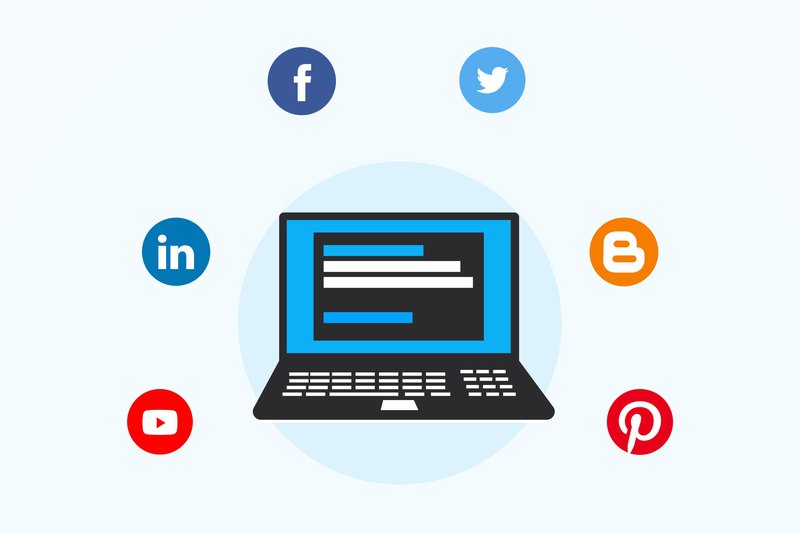
Social Bookmarking Benefits
Social bookmarking is an effective off-page SEO strategy that can increase your online presence and web traffic. Here’s how:
- Backlinks. Whenever your content gets featured on a bookmarking website, it creates a backlink. Backlinks are and have always been a major metric for ranking a web page.
- Website Traffic. Bookmarking has a direct effect on ranking and, therefore, it can generate traffic for you. When your company appears on one of the bookmarking sites, people are likely to follow the link directly to your site. If the information is engaging, it can lead to thousands of new visitors each month.
- Social Signals. When Google, Yahoo, and others want to determine how big and popular the site in question is, they will look at your social signals. Social bookmarks are considered to be one of such factors.
Influencer Marketing
This type of marketing is reliant on promoting the product/service to a number of trusted industry experts and relying on them to deliver your branding message to their audience made up of mostly engaged, dedicated people.
How Does Influencer Marketing Work?
Social media influencers have passionate, devout followers who are much more likely to be heavily invested in a specific niche. By getting in touch with influencers, you’re killing two birds with one stone: you’re reaching the thousands of people following them and sending your message through a person that has earned cred in your industry.
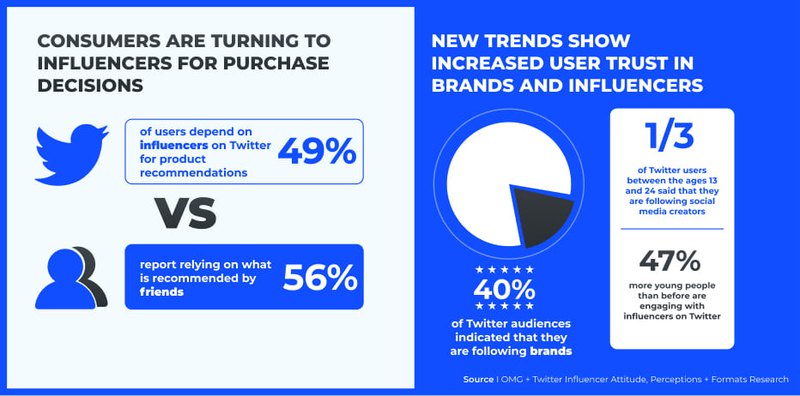
Brand Mentions
Google has a weak spot for brands, we all know that. Therefore, building a brand is as much of a must for SEO as it is for marketing. All beginner entrepreneurs should make an active effort to increase their online authority for your audience and search engines alike.
The question is, how exactly does brand awareness intersect with SEO, and what can be used to measure the success of your efforts?
One of the key metrics to track is brand searches. This is when people google your brand name, specific names of your products, or your domain name. The increase in the number of searches for your brand means you’re heading in the right direction.
Diligent work on brand-building helps Google algorithms understand and evaluate your credibility. One of the direct positive consequences of brand-building is that you are attracting more and more people to your website without ever proactively increasing your link-building efforts.
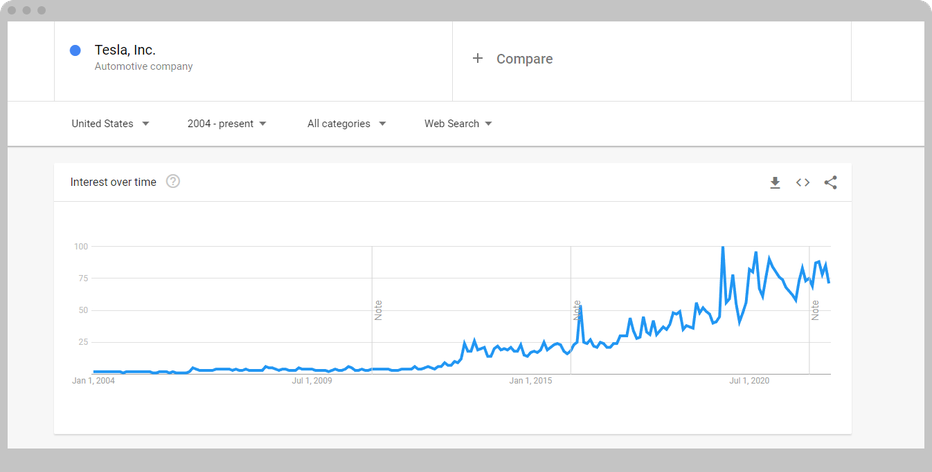
Local SEO (GMB & Citations)
Local SEO is a separate branch of SEO that deserves its own conversation. However, there are two off-page SEO techniques that deserve a special mention in this article — citations and your Google My Business listing.
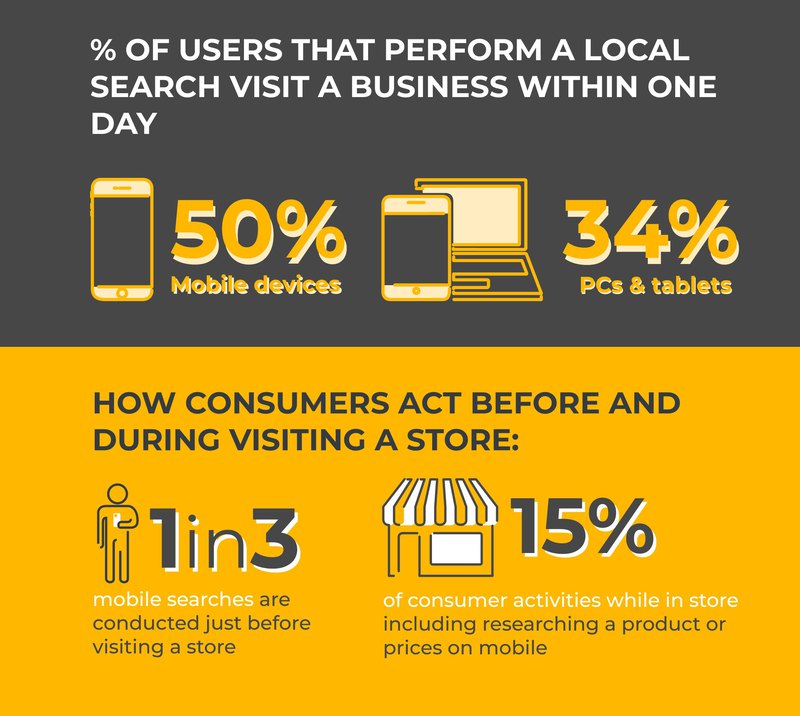
Google My Business
Any actions focused on optimizing your webpage to get it to rank higher on the Google Map Pack are regarded as off-page SEO. An account in GMB is a powerful tool essential to boosting the digital presence of local startups and businesses.
Reports say 4 in 5 consumers use search engines to find local information. If your business is not showing up at the top of the local GMB results, this spot will be taken by your rivals.
Citations
A citation is a reference to your company or brand online that features your NAP (name, address, and phone number). These business listings on Google My Business, Yelp, Facebook, and other online directories are considered a key tool in advancing your brand on the web.
Citations is one of the most actionable off-page SEO methods that can help you to step your game up. If you are looking to rank for keywords tied to a specific geographic location, for example, “top plumbing service in New York”, citations are a surefire way to achieve that. Remember that consistency is key here: inconsistency demonstrates a lack of coherency, so don’t neglect NAPs! Ensure that your NAP data represents your brand in a coordinated way.
Customer Reviews
When working on off-page SEO in 2022, the role of customer reviews is hard to overestimate. Reviews guide how regular users and search engine crawlers perceive your brand. Sites with positive reviews appear more credible and therefore are more likely to get to the top of search results. In addition, a positive online reputation leads to better conversions. Returning users are one of the behavioral factors that will boost your credibility in the eyes of search engines.
Google, Yelp, and Facebook are the three most popular review options, but don’t stray away from other platforms such as TripAdvisor or Superpages. There are four efficient ways to get a customer to write a review:
- Sincere desire. This one is obvious. If you’re offering a product or service of exceptional quality, people will want to talk about it.
- Contests. Try offering a gift (bonus point if it’s one of your products) for the most interesting review.
- Discount. A small bonus is another reason to leave feedback.
- Just ask. Sometimes, a simple request to leave a review can do the trick.
Forums
Perhaps the most unexpected from off-page SEO techniques, but no less effective way is forums. This element is a great option for promoting your business. On the forums, you can post links to your pages, track customer reactions and comments on your services and products, establish trusting relationships with potential customers and respond to negative comments in a timely manner.
Events
Another method of off-page SEO, which at first view has nothing to do with website promotion, is the organization of events. Yes, this method will require more effort and investment than building links and advertising in other sources, but online events are a great opportunity to promote your business on the Internet.
Podcasts
Looking for a way of website promotion outside of popular search engines? Then podcasts are what you need. Profitable advertising of your business in an unusual format will attract the attention of the target audience, and the absence of a large number of competitors in the off-page SEO field of podcasts will help to become recognizable.
Guest Posting
As a type of link building strategy, a guest posting is an off-page SEO element which puts your brand in front of a targeted audience and earns targeted traffic. It’s a way to attract new target audiences and create your brand’s recognition among competitors.
PR
Digital PR is a modern tactic of link building from reputable sources. This method of promotion is used to attract organic traffic, increase brand awareness and position yourself as an expert in a specific field, as to promote a great story and corresponding linkable assets, and it is possible to earn significant volumes of links as a result.
Final Thoughts
Now that you’ve got your response to the question “what is off-page SEO?”, don’t limit your digital advertising efforts to standard engine optimization activities like links or blogging. Your site is an intrinsic part of the ever-evolving Internet ecosystem where you are constantly being evaluated and graded by Google with on-page and off-page SEO promotion strategies. Thanks to the ongoing updates to Google algorithms, the quality of content now is better than ever before, meaning you have a lot of competitors to contend with.
The bottom line is, your best course of action is to continue to strengthen the technical performance of your site and create original content, meaningful articles, make videos, etc. but just don’t stop here. Whenever off-page SEO is concerned - think big, think bold!


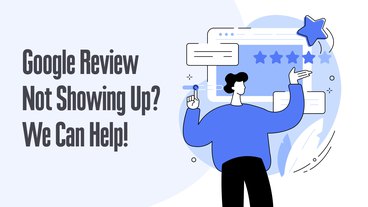
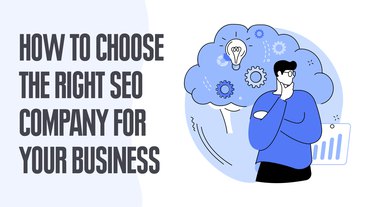
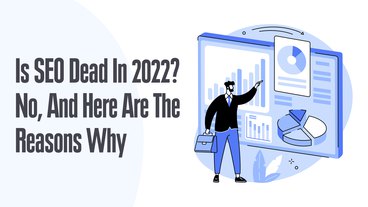
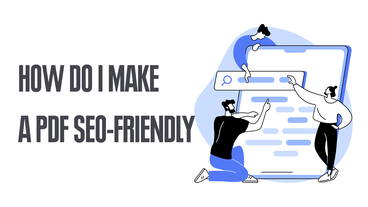
Comments
Really well mention the blog. It is very very helpful for me. Thank you so much, guys. I appreciate your hard work.
It is truly a great and useful piece of info. I am glad that you simply shared this useful information with us.
Please keep us informed like this. Thanks for sharing.
While reading your post. I got so many knowledgeable things. Thanks for sharing. Keep sharing. We always looking for your coming article.
After reading your post. I think it is the best post that you have created for us. Thank you so much for sharing this post
Really useful information about Off page Seo. content and way of writing image placement is really fine.
That was an amazing article about off-page SEO, it helps me in understanding how off-page SEO is important.
reading your post. I think it is the best post that you have created for us. Thank you so much for sharing this post
I was not aware with off page SEO , after reading this blog shows that how much off page SEO is important to rank website